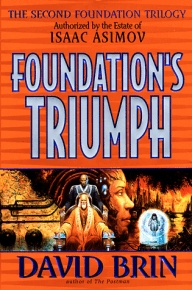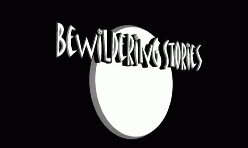David Brin’s Foundation’s Triumph
reviewed by Don Webb

|
|
Foundation’s Triumph Author: David Brin Publisher: Harper Prism Hardcover: May 1999 Length: 314 pp. ISBN: 0-06-105241-8 Price: $25 US |
Brin is watching Daneel, who is watching Big Brother, who is watching... Oh, forget it.
If you’re a fan of Asimov’s “Foundation” series, curiosity or a sense of duty may move you to read the subseries about the Second Foundation. Hiring the “killer B’s” (Benford, Bova and Brin) was a marketing ploy that guaranteed success. Unfortunately I think it will soon be forgotten, if it hasn’t been already. After Asimov, reading it is something of a penitential chore.
To be fair, David Brin struggles mightily with the issues inherent in Asimov’s creation. For example, are the two Foundations necessarily a good thing? How can Seldon’s “psychohistory” amount to more than a political platform in the face of chaotic historical events? What are the social and psychological implications of telepathy? How can the gap be bridged between morality and Asimov’s “Three Laws of Robotics”?
Brin is on the right track in having his characters wrestle with such issues, and each question is worth a short novel of its own. Alas, while Brin humanizes the problems, he does little more than restate them. In hindsight, Asimov’s continuators may have missed a series of great opportunities.
What, then, is Foundation’s “triumph”? It’s hard to tell. At the end, Hari Seldon wagers with humanity’s éminence grise par excellence, R. Daneel Olivaw, that his two Foundations are not foredoomed to irrelevance. Rather, they will continue to foster individuality even after humanity has plugged into Daneel’s “Galaxia,” which will be a kind of cosmic, “mentalic” Internet. At least that expands a little on Asimov’s “Galactic Spirit,” which was originally a throw-away concept exploited briefly and a trifle cynically in Foundation.
David Brin starts Foundation’s Triumph with some enthusiasm, but it eventually flags. He seems to realize he’s stuck to a Tar Baby and, like Bre’r Fox, gets entangled in contrivances that become all the more implausible and convoluted the more he tries to extricate himself. To take what I consider the worst example, it is quite gratuitous to rewrite completely Joseph Schwartz’s adventure from Pebble in the Sky; it makes Daneel’s ubiquitous string-pulling tiresomely meddlesome. Worse, Asimov’s humble hero is recast as an unwitting puppet. Asimov made Schwartz’s story a very human one; Brin reduces its significance — and, what the heck, that of all future history — to a meaningless charade.
In terms of plot, the biggest mistake in Foundation’s Triumph is trying to tie in almost all of Asimov’s galactic novels. The story loses any dynamic of its own and becomes a kind of — pardon the expression — encyclopedic encomium. We thus see the potboiler genre redefined as a battle of irrelevant dei ex machinas. If this is a “triumph,” I’d hate to see what anything less looks like. Brin explains in an afterword that he leaves a lot of loose ends to follow up. Please take my advice: Spare us!
Copyright © 2003 by Don Webb

